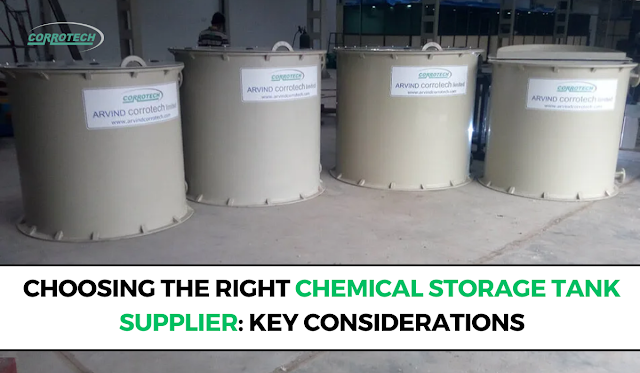Choosing the Right Chemical Storage Tank Supplier: Key Considerations
The safe and efficient storage of chemicals is paramount for any industry that utilizes them. Selecting the right Chemical Storage Tank Supplier plays a critical role in achieving this objective. A reliable supplier will provide tanks that meet your specific needs, comply with regulations, and ensure the safety of your personnel and the environment.
Importance of Selecting the Right Chemical Storage Tank Supplier
Chemical storage tanks are not one-size-fits-all solutions.
Choosing the wrong supplier can lead to several problems:
- Safety
hazards: Incompatible materials or inadequate tank construction
can lead to leaks, spills, and even explosions.
- Compliance
issues: Non-compliant tanks can result in fines and operational
shutdowns.
- Inefficiency: Tanks
that are not suited to the chemicals being stored can lead to product
degradation, increased maintenance costs, and operational downtime.
- Environmental
impact: Improper storage can cause environmental damage due to
leaks or spills.
By investing time in selecting the right supplier, you can
ensure the safe, efficient, and compliant storage of your chemicals.
Overview of Key Considerations for Making an Informed Decision
When evaluating potential suppliers, several factors merit
careful consideration. These include understanding your requirements, assessing
quality and material selection, evaluating customization options, considering
reputation and reliability, analyzing cost and value, ensuring compliance with
regulations, and assessing environmental impact.
Understanding Your Requirements
Before approaching suppliers, take time to clearly define
your needs. This includes:
- Type
and volume of chemicals to be stored: Identify the specific
chemicals and their compatibility with different tank materials. Consider
the volume required for each chemical.
- Storage
environment: Will the tanks be used indoors or outdoors? What are
the expected temperature and pressure ranges?
- Regulatory
requirements: Ensure the tanks comply with all relevant
regulations for the chemicals being stored.
Quality and Material Selection
- Material: The
supplier should offer tanks constructed from high-quality materials that
are compatible with the chemicals being stored. Common materials include
polyethylene (PE), polypropylene (PP), and fiberglass reinforced plastic
(FRP).
- Manufacturing
process: Choose a supplier with a proven track record of using
quality manufacturing processes to ensure tank integrity and durability.
- Certifications: Look
for suppliers who adhere to industry standards and obtain relevant
certifications for their tanks.
Customization and Flexibility
- Tank
size and design: Select a supplier that offers a variety of tank
sizes and designs to meet your specific needs. This might include
horizontal vs. vertical tanks, jacketed tanks for temperature control, and
tanks with specific agitation or mixing requirements.
- Accessories
and add-ons: Consider whether you need additional features like
level gauges, valves, vents, or platforms, and choose a supplier who can
provide these along with the tanks.
Reputation and Reliability
- Industry
experience: Look for a supplier with extensive experience in the
chemical storage tank industry.
- Customer
service: Choose a supplier that is responsive, knowledgeable, and
provides excellent customer service.
- Warranty
and after-sales support: Ensure the supplier offers a solid
warranty and dependable after-sales support for any maintenance or
repairs.
Cost and Value Analysis
- Price: While
cost is a factor, prioritize quality and suitability over the cheapest
option.
- Total
cost of ownership: Consider not just the initial purchase price
but also factors like installation, maintenance, and potential replacement
costs.
- Value
proposition: Choose a supplier that offers a good balance between
price, quality, and features that meet your specific needs.
Compliance and Regulations
- Regulations: Identify
all relevant regulations for chemical storage tanks in your region.
- Supplier
compliance: Ensure the supplier has a thorough understanding of
the regulations and offers tanks that are fully compliant.
- Documentation: The
supplier should provide all necessary documentation demonstrating
compliance with relevant standards.
Environmental Impact
- Sustainable
materials: Inquire about tanks made from recycled materials or
those with a lower environmental footprint.
- Spill
prevention and containment: Choose a supplier that offers spill
containment solutions to minimize environmental impact in case of
accidental leaks.
Conclusion
Choosing the right chemical storage tank supplier is a
crucial decision. By carefully considering your requirements, the quality and
compatibility of materials, customization options, supplier reputation,
cost-effectiveness, regulatory compliance, and environmental impact, you can
ensure the safe, efficient, and responsible storage of your chemicals.

.webp)
.png)
.webp)
Comments